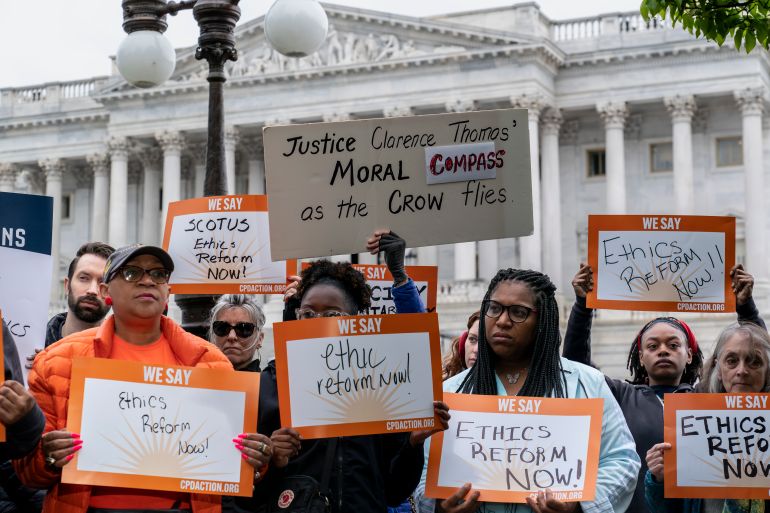US lawmakers hold hearing on Supreme Court ethics concerns
The hearing comes in the wake of several reports detailing the failure by justices to report possible conflicts of interest.

United States lawmakers have taken aim at the ethics of the country’s highest court, saying that Congress must step in to increase oversight in the wake of recent reports that showed some justices had failed to report gifts and real-estate sales that could constitute potential conflicts of interest.
US Senate Judiciary Committee Chairman Dick Durbin, a Democrat, said he had called the hearing on Tuesday because the Supreme Court has for years “refused” to “step up and fix this themselves”.
Keep reading
list of 3 itemsUS Justice Clarence Thomas responds to unreported luxury travel
US Supreme Court weighs Biden’s college student debt relief
“It is critical to our democracy that the American people have confidence that judges cannot be bought or influenced, and that they are serving the public interest, not their own personal interest,” he said at the beginning of the hearing.
Critics, meanwhile, accused Durbin of overstepping his bounds, with some suggesting the hearing was motivated by the court’s rightward lurch in recent years. The court is currently dominated by conservatives, six to three.
“We can talk about ethics and that’s great, but we’re also going to talk about today … a concentrated effort by the left to delegitimise this court and to cherry-pick examples to make a point,” said Lindsey Graham, the ranking Republican on the committee.
Reporting from Washington, DC, Al Jazeera’s Heidi Zhou-Castro said the hearing was launched following reports that showed Justice Clarence Thomas had failed to report luxury travel provided by a Republican political donor, billionaire real estate tycoon Harlan Crow.
The justice also allegedly failed to report a real estate purchase Crow made from him. Thomas has characterised his lack of disclosures as the result of a simple misunderstanding.
Also at issue is a report from the publication Politico that showed conservative Justice Neil Gorsuch failed to disclose that a property he partially owned in Colorado had been sold to the chief executive of a major law firm that regularly argues cases before the court.
Zhou-Castro said that, unlike other federal judges, “the US Supreme Court is not bound to comply with a code of ethics”.
“The US Constitution sets up the Supreme Court to be a co-equal branch of the government, meaning Congress cannot tell it what to do essentially. And there’s little Congress can do to change that,” she said. “But that’s certainly not stopping them from trying.”
US Supreme Court Chief Justice John Roberts, in a letter declining an invitation to testify before the committee, said that the top court in 1991 voluntarily adopted a resolution to “follow the substance” of a code of conduct set by the Judicial Conference of the United States, the policymaking body for the broader federal judiciary.
Since then, he added, the justices have followed disclosure requirements on gifts and outside income. His letter was signed by all nine justices.
Still, in his opening statement, Durbin said the court’s present policy of self-oversight falls short.
“Last month we learned about a justice who, for years, has accepted lavish trips and real estate purchases worth hundreds of thousands of dollars from a billionaire with interest before the court,” Durbin said. “That justice failed to disclose these gifts and has faced no apparent consequences under the court’s ethics principles.”
“We wouldn’t tolerate this from a city council member or an alderman. It falls short of ethical standards we expect from any public servant in America, and yet the Supreme Court won’t even acknowledge it’s a problem,” he said.
Testifying before the committee, Jeremy Fogel, a retired federal judge, said it was important during a period of hyper-partisan divide that the Supreme Court take further steps to rebuild public confidence. Trust in the top court has historically been higher than in other US institutions, he pointed out.
A September 2022 Gallup poll showed a drop in trust in the Supreme Court, with only 47 percent of Americans saying they had a “great deal” or “fair amount” of confidence in the institution. The percentage was the lowest since 1972 and represented a 20 percentage point drop from just two years earlier.
“Many Americans already think that the justices decide cases based on their political preferences and alliances rather than the law,” Fogel said. “Lack of clarity about the justices’ ethical obligations only feeds that perception.”
Meanwhile, Michael Mukasey, who served as attorney general under former President George W Bush, said the pre-existing guidelines were sufficient for the Supreme Court. He added that efforts by Congress to intervene would overstep constitutional bounds.
“It’s basically the structure of our government that the executive, legislative and judicial branches remain separate. It is the Supreme Court and not the Congress that has the constitutional prerogative to decide whether to adopt the formal code of conduct governing the individual justices,” he said.
In addition, Mukasey suggested the ethical concerns were rooted in political vendettas against the conservative court.
“If the public has a mistaken impression that the integrity of the court has been damaged, the fault of that lies for those who continue to level unfair criticism of the court and its justices,” he said.
“It’s impossible to escape the conclusion that the public is being asked to hallucinate misconduct, so as to undermine the authority of justices who issue rulings with which the critics disagree and thus to undermine the authority of the rulings themselves.”